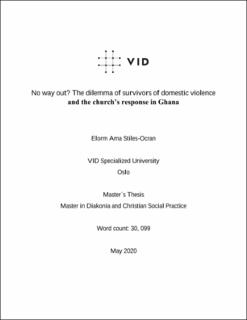| dc.description.abstract | Domestic violence/intimate partner violence is a scourge affecting Anlo Ewe women in Ghana’s southeastern region due to the prevalence of a patriarchal culture of male dominance interplayed with religion. The narrow interpretation of Malachi 2:16, among others, adds to women’s predicaments. This study answers the question: ‘what characterize the experiences of Anlo Ewe women on violence and divorce in marriage and what are their perceptions of the role of the church in this regard?’ Through semi-structured interviews, narratives of ten female survivors of violence married/divorced/separated; nine of whom are Christians from eight different faith traditions (Mainline, Charismatic, Pentecostal and African Independent Churches) and one a traditional believer, were canvassed. Using the intersectionality approach through the help of four relevant conceptual frameworks (gender and feminist theory; individual autonomy and community/ubuntu; religious coping; and ecclesiology and diakonia), this study reveals a complex interplay of culture and religion and gender differentiations that contribute to men’s abusive nature, infidelities, control over women’s sexualities and women’s slavery in marriage. As a result, women experience various forms of abuse some of which are interrelated. This study also reveals that, poverty, the sociological and traumatic effects of divorce on children, the shame and stigma of violence and divorce self imposed by these women and by the community, silence and women’s fear of further victimization by men, cause women to suffer abuse. These factors and churches’ deceptive and culture compliant theology on marriage and divorce put women in dilemma as they feel caged in marriage with no way out. In addition, this study reveals the manner in which faith is used to cope is destructive and argues for churches to take a critical look at their theologies and for women to engage in a contextual Bible study. Further, there is an uneven emphasis on the place of the community in the lives of women that reveals a tension and a paradox which needs to be ironed out. Churches’ diaconal mission to those outside their communities is found to be lacking and their impact is nominal. To add, Ghana’s laws on domestic violence is found to be ineffective, suggesting there is more to be done by churches and the nation as a whole. | en_US |
